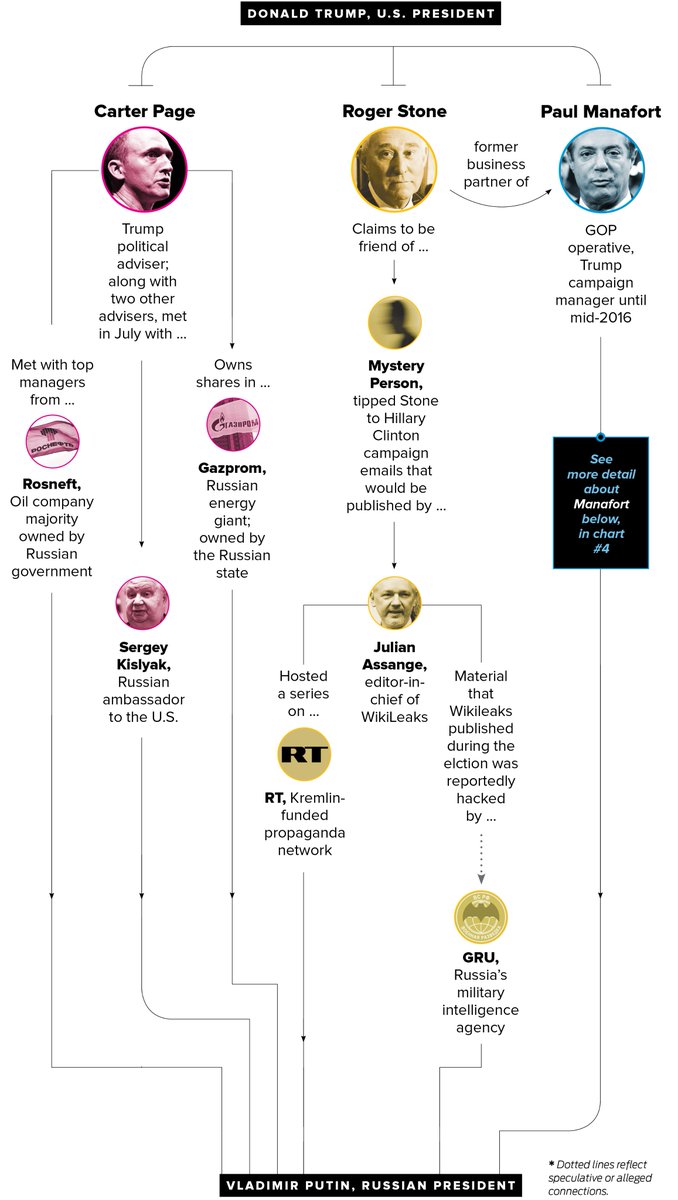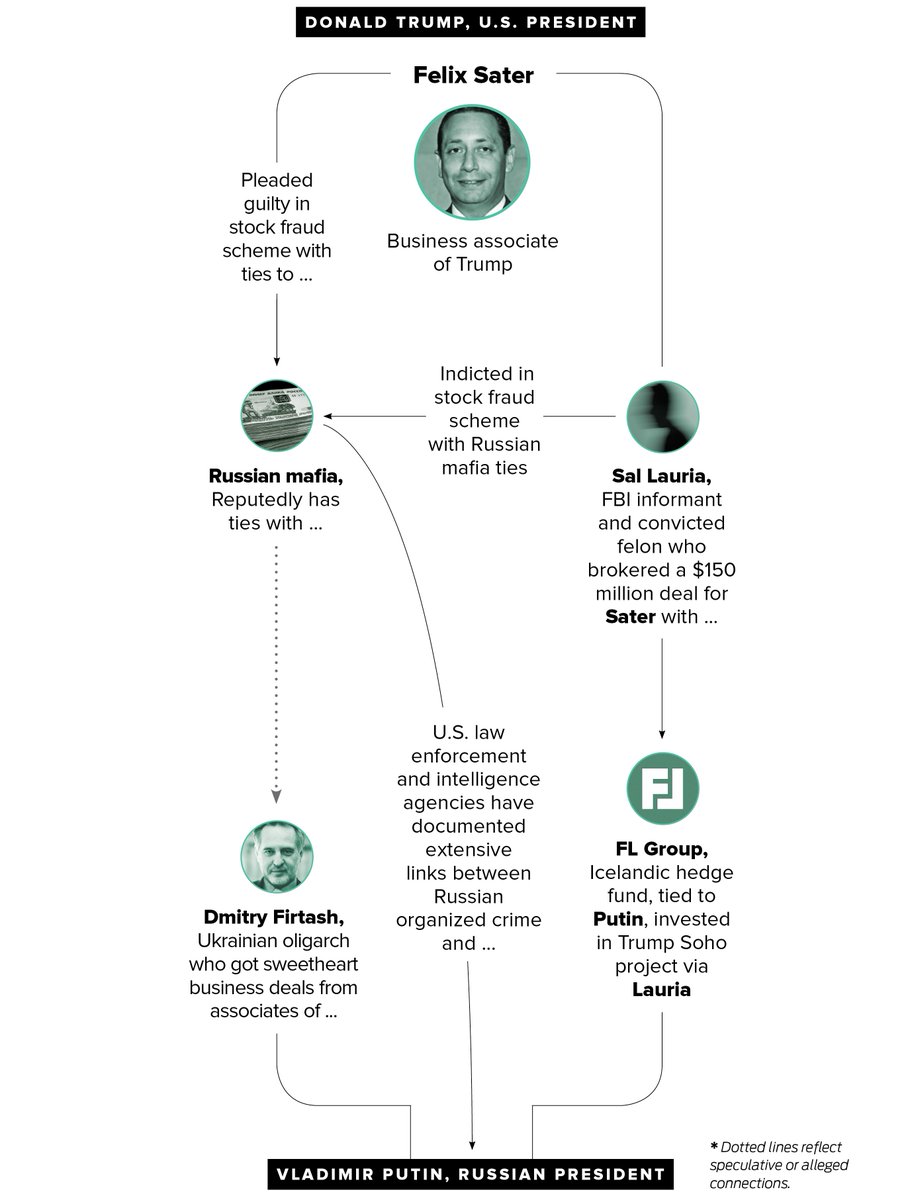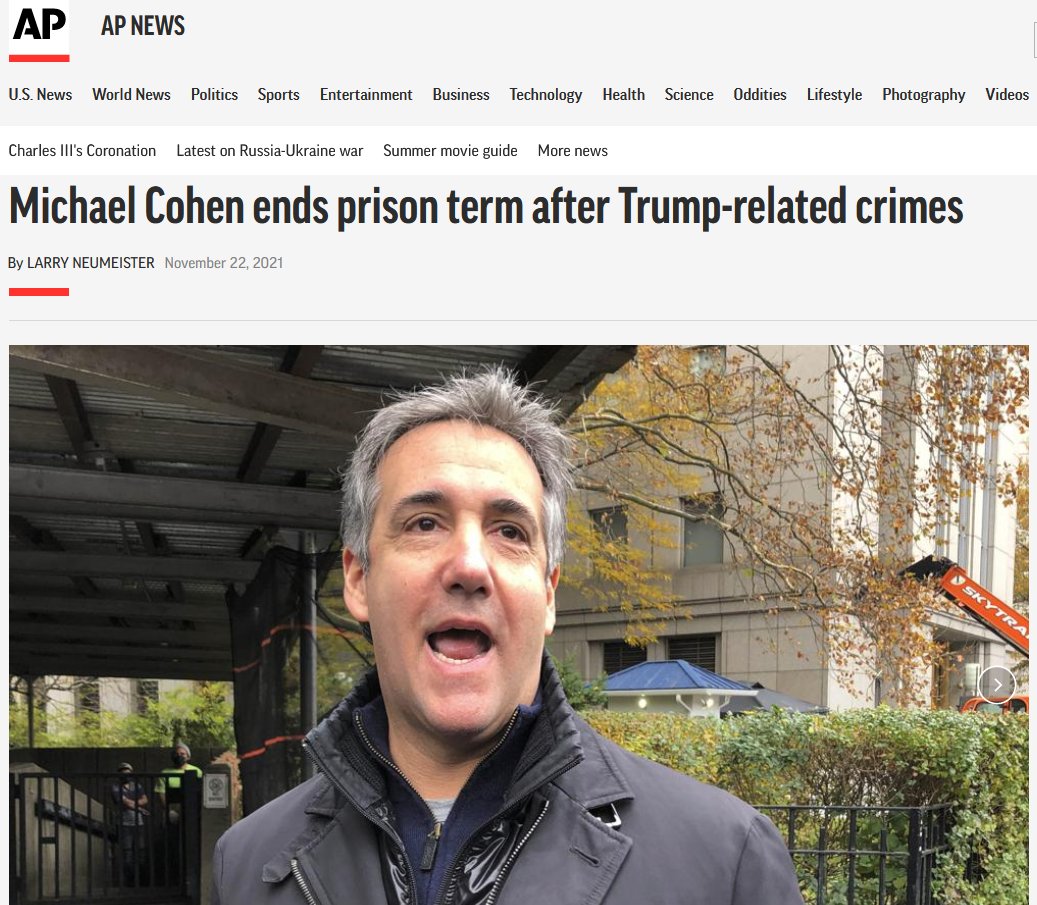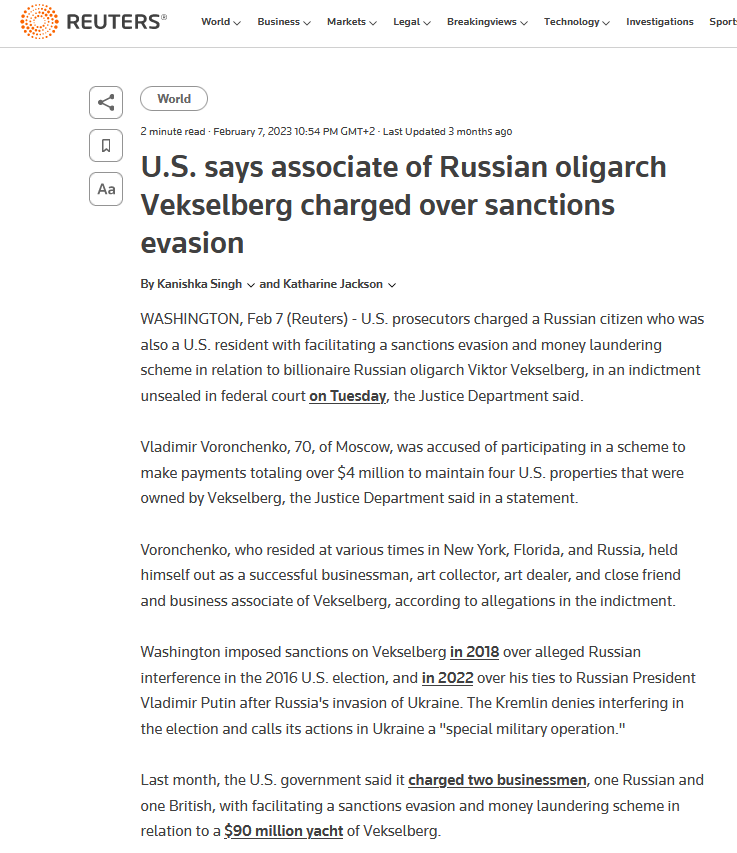In today's #vatniksoup, I'll talk about the Trump 2016 presidential campaign, and how it was connected to various Russian actors.
In this retrospect, I'll introduce some of the people who worked in Trump's 2016 campaign for the presidency, outlining their activities.
1/23
In this retrospect, I'll introduce some of the people who worked in Trump's 2016 campaign for the presidency, outlining their activities.
1/23

After becoming the president of his father's real estate ventures in early 70s, he started expanding its operations aggressively by building hotels, casinos and whatnot. Trump's businesses have been involved in over 4000 legal actions & he's filed for bankruptcy six times.
2/23
2/23

While studying in college during the Vietnam War era, Trump deferred draft four times. After his graduation, he was diagnosed with bone spurs, thus avoiding going to the war. This diagnosis was allegedly made by a podiatrist, Dr. Larry Braunstein, who rented his office from..3/23 



Donald's father, Fred Trump. Dr. Braunstein’s daughters said that they "know it [the diagnosis] was a favor" to Donald's father.
Now, I'm a simple man & have no deep knowledge of legal terms and obstructions or collusion, etc., which is why I will try and explain Russia's..
4/23
Now, I'm a simple man & have no deep knowledge of legal terms and obstructions or collusion, etc., which is why I will try and explain Russia's..
4/23

..interference in the 2016 US election and their connection to Trump through simple examples. This way, you can be the judge if there was any shady collaboration or not. Because the whole process can be confusing, I will share charts visualizing the connections, made by...
5/23
5/23

...Erin Aulov and Janet Michaud of @POLITICOMag.
First of all, Trump has had a lot of business interests in Russia. He had undertaken a project to build a Trump skyscraper in Moscow. This idea came to be during his visit to Moscow in 1987, and was later pushed by Felix...
6/23
First of all, Trump has had a lot of business interests in Russia. He had undertaken a project to build a Trump skyscraper in Moscow. This idea came to be during his visit to Moscow in 1987, and was later pushed by Felix...
6/23

...Sater, a Russian-born businessman with mob connections. In 2008 he sold a Palm Beach mansion to Russian oligarch, Dmitry Rybolovlev for 95 million USD, while four years prior he only paid 41 million USD for the estate.
Trump "water[ed] down the toughest penalties the...
7/23
Trump "water[ed] down the toughest penalties the...
7/23

U.S. had imposed on Russian entities" after Putin annexed Crimea in 2014. He also supported Russia's return to the G7. In 2017, Trump revealed highly classified information to foreign minister Sergei Lavrov and to the Russian ambassador Sergey Kislyak. US media was not...
8/23

8/23


...allowed in this meeting, but there was a Russian photographer present.
Next, I'll introduce various people who worked on Trump's presidential campaign, and outline their connections to the Russian officials, businessmen, diplomats, intelligence agents, etc.
9/23
Next, I'll introduce various people who worked on Trump's presidential campaign, and outline their connections to the Russian officials, businessmen, diplomats, intelligence agents, etc.
9/23
Jeff Sessions, President Trump’s Attorney General, had talks with Kislyak during the 2016 election. Sessions denied, under oath, of having any communications with the Russians. He later recused himself from any further investigations on the matter.
10/23
10/23

Trump's former Secretary of State, Rex Tillerson, worked on various projects in Russia for two decades & was publicly described as having "very close relationship" with Putin. In 2013,he was awarded with Russia’s Order of Friendship,a highest honor available for foreigners.
11/23
11/23

Michael Flynn, Trump's former advisor, was a guest at RT party in Moscow in 2015, sitting right next to Putin. He was paid 33 750 USD for his speech at the gala, and "forgot" to report this payment.
Here's my soup on Flynn:
12/23
Here's my soup on Flynn:
https://twitter.com/P_Kallioniemi/status/1610538223880765442
12/23

Carter Page, who worked as a a foreign policy advisor in Trump's campaign, had deep ties to Gazprom. The Trump campaign approved his trip to make a speech in Moscow, in which he criticized the US foreign policy. In 2013, Russian agent, Victor Podobnyy, tried to recruit Page.13/23 



Another foreign policy advisor, George Papadopoulos, was organizing the dirt campaign on Hillary Clinton. He arranged meetings between the campaign and Russian government officials. He later pleaded guilty to a felony charge of making false statements to FBI agents.
14/23
14/23

Roger Stone, a former advisor to Trump, had backchannel talks with Julian Assange of Wikileaks, and with Guccifer 2.0, the hacker persona believed to be behind the DNC hacks.
Here's my soup on Stone:
15/23
Here's my soup on Stone:
https://twitter.com/P_Kallioniemi/status/1650797702064529409
15/23

Paul Manafort,Trump's former campaign manager, had received almost 13 million USD from the former Ukrainian, pro-Russia president,Yanukovych. Already in 2005, he'd made a plan to influence politics and business in the US to benefit Putin. Some soup:
16/23
https://twitter.com/P_Kallioniemi/status/1622213798403739649
16/23

Former senior advisor to Trump, Felix Sater wrote an e-mail to Trump's lawyer, Michael Cohen, saying that "Our boy can become President of the USA and we can engineer it. I will get all of Putins team to buy in on this, I will manage this process".
17/23

17/23


Donald Trump Jr. has stated that his father's businesses "see a lot of money pouring in from Russia". In 2016, Don Jr. met with a group of Russians, looking to get some dirt on Hillary Clinton.
Here's my soup on Don Jr.:
18/23
Here's my soup on Don Jr.:
https://twitter.com/P_Kallioniemi/status/1646141647988703233
18/23

Jared Kushner, Trump's son-in-law, met with Kislyak, and at Kislyak's request, later met with Sergey Gorkov, the head of Kremlin-owned bank with close ties to Putin. The bank was put under sanctions after the annexation of Crimea.
19/23

19/23


Michael Cohen, a former lawyer of Trump's, was pursuing the Trump Tower deal in Moscow while Trump was running for president. He also allegedly met Russian officials in Prague. In 2017, he met with Ukrainian opposition politician to lay out a plan to give Russia more...
20/23
20/23

...control over Ukraine and to lift the US sanctions against Russia.
Wilbur Ross, Trump's former Secretary of Commerce, was the biggest shareholder in the Bank of Cyprus, an institution deeply connected to Russian investors and close associates of Putin.
21/23
Wilbur Ross, Trump's former Secretary of Commerce, was the biggest shareholder in the Bank of Cyprus, an institution deeply connected to Russian investors and close associates of Putin.
21/23

In 2017, Ross was questioned about his connections to other Bank of Cyprus investors, oligarchs Viktor Vekselberg and Vladimir Strzhalkovsky.
22/23

22/23


Trump pardoned five people who were convicted as a result of investigations on the Russian interference in the 2016 US elections, including Michael Flynn, Roger Stone and Paul Manafort.
So, what do you think, collusion or no collusion?
Source: politico.com/magazine/story…
23/23
So, what do you think, collusion or no collusion?
Source: politico.com/magazine/story…
23/23

Support my work: buymeacoffee.com/PKallioniemi
Past soups: vatniksoup.com
Related soups:
Russiagate:
Dmytro Firtash:
Oleg Deripaska:
Past soups: vatniksoup.com
Related soups:
Russiagate:
https://twitter.com/P_Kallioniemi/status/1617852982095405056
Dmytro Firtash:
https://twitter.com/P_Kallioniemi/status/1623234276371185666
Oleg Deripaska:
https://twitter.com/P_Kallioniemi/status/1621839545456017410
If you have few extra minutes to spare, do read my op-ed from last January on how the Russians operated in Europe:
bylinetimes.com/2023/01/20/rus…
bylinetimes.com/2023/01/20/rus…
• • •
Missing some Tweet in this thread? You can try to
force a refresh

































